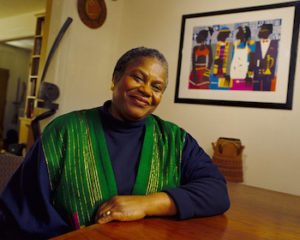
Bernice Johnson Reagon
*Bernice Johnson Reagon was on this date in 1942. She is a Black folk song leader, composer, scholar, and social activist.
Bernice Johnson was the daughter of Beatrice and J.J. Johnson, a Baptist minister. She was born and raised in southwest Georgia, where church and school were an integrated part of her life, with music heavily intertwined in both settings. She began school at three when her teacher asked her to attend early, and she passed that first year. By the time she was in the 4th, 5th, and 6th grades, she tutored students in the 1st, 2nd, and 3rd grades. Reagon joined her first and only gospel choir when she was eleven, organized by her sister at the Mt. Early Baptist Church. She and the choir would listen to the local radio station WGPC to learn black gospel for the choir to recite.
She entered Albany State College in 1959, where she began her study of music. She also became active in the local NAACP chapter and then the SNCC. Her first demonstration had been to protest the arrest of Bertha Gober and Blanton Hall in 1961. After being expelled from Albany State because of the arrest, she briefly attended Spelman College. She joined the SNCC Freedom Singers in 1962. The group realized that singing helped provide an outlet and unifier for protestors struggling with mob behavior and police brutality. Thanks to her roles with SNCC and the Freedom Singers, Reagon became a highly respected song leader during the 20th-century American Civil Rights Movement.
In 1963, she married Cordell Reagon, another member of The Freedom Singers. Their daughter, Toshi Reagon, is also a singer-songwriter. Later, she returned to Spelman to complete her undergraduate degree in 1970. In 1973, Reagon founded a six-member, all-female, a-cappella group called Sweet Honey in the Rock. In addition to Reagon, the women in the original group were Ysaye Maria Barnwell, Nitanju Bolade Castle, Shirley Childress Johnson, Aisha Kahil, and Carol Maillard. The only instrument they used was their voices, along with shekere and tambourine.
She received a Ford Foundation fellowship to graduate study at Howard University, where she received a Ph.D. degree in 1975. In 1974, Reagon was a cultural historian in music history at the Smithsonian Institution, where she directed a program called Black American Culture in 1976 and was later a curator of music history for the National Museum of American History. In 1989, she was awarded a MacArthur Fellowship. Reagon specializes in African American oral history, performance, and protest traditions. She has served as a music consultant, producer, composer, and performer on several film projects, such as Eyes on the Prize (1987) (in which she also appeared) and The Civil War (1990). She was the conceptual producer and narrator of the Wade in the Water, African American Sacred Music Traditions radio series.
Her work as a scholar and composer is reflected in her publications on African-American culture and history, including a collection of essays entitled If You Don't Go, Don't Hinder Me: The African American Sacred Song Tradition (University of Nebraska Press, 2001); We Who Believe In Freedom: Sweet Honey In The Rock: Still on the Journey, (Anchor Books, 1993); and We'll Understand It Better By And By Pioneering African American Gospel Composers (Smithsonian Press, 1992).
Since Reagon retired in 1993, she continued to work in African American Songs of Protest as a Curator Emeritus. She was appointed Distinguished Professor of History at American University (AU) in Washington, DC, from 1993 to 2003. Reagon has since been named Professor Emerita of History at AU and holds the title of Curator Emeritus at the Smithsonian. When she speaks about her upbringing in the musical culture, she explains that even her early schooling was heavily involved with music, not just the church. Reagon says that her teacher would lead the students outside to play games that included singing with their hands, feet, and voices.
Reagon claimed that she grew up in a church without a piano, so her early music was a cappella, and her first instruments were her hands and feet. And she explains, "That's the only way I can deal comfortably with creating music." In 1991, Reagon received a Candace Award from the National Coalition of 100 Black Women. In 1996, Reagon won the Isadora Duncan Award. In April 2009, Reagon received an honorary doctoral degree from the Berklee College of Music. 2000 she won the First National Leeway Laurel Award in the Leeway Foundation in Philadelphia. Reagon believes, "Life's challenges are not supposed to paralyze you; they're supposed to help you discover who you are." She also said there was so much done because the black culture was the only thing black people could call their own. That is why she feels black culture is the most powerful in the world.
To Become a musician or Singer
To Become a Conductor or Composer